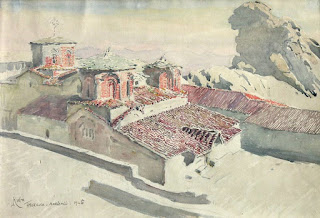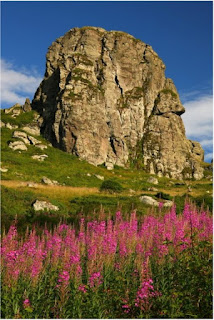Treskavec Monastery. Beautiful 1925 watercolour by Czech painter Ludvik Kuba 1863-1956...A very interesting monastery indeed...Here is why:

Treskavec (The Holy Mother of God) Monastery, sits right below the 1270m high Zlatovrv (Golden peak) of the Babuna Mountain, which is located 6.5 km north of Prilep, Macedonia...Pic taken by Geoff Wong in 2009...
The word "babuna" means "a woman with an evil look in her eyes" 🙂. But the word is also a feminine form of the word "babun" which in Medieval Church Slavonic meant "heretic".
So female heretic = a woman with an evil look in her eyes 🙂
Interestingly, the word "Babuna" is derived from the word Baba which means Grandmother, but which once meant any woman who had a child or who delivered a child (Mother, Grandmother, Midwife)...
Here we come to Dajbaba (the earth mother), the wife of Dajbog (the sky father)...Milan Budimir talked about her in his paper "Trikleti babuni i babice patarenske" (Serbocroatian) and directly linked her to Baba and Babuna...And Kybele (Kubaba)...
Now, the word baba used to have one more interesting meaning in South Slavic languages: stone, rock, mountain...And hence Mother Earth...There are mountains and mountain tops with the names whose root is Baba all over the Balkans. Like this one, Babin zub (Baba's tooth) from Serbia...
I wrote about them in my post "Baba, mountains and crags"..
And there is folklore related to Baba = Mother Earth all over Balkans too...I talked about it in my post "Living stone"...
In Slovenia in the past, a peace of stone that was cut from the wall of a quarry, had "to calm down", because it had been torn off the "mother's body" and was perceived as still alive for a certain time...
And so...Treskavec Monastery is located on Mountain Babuna, whose name was once probably Baba (Goddess) and was turned to Babuna (An evil woman, Pagan woman? Pagan goddess?) most likely by Christians, when the area around (the holy mountain) was Christianised...
Interestingly, the local population preserved the memory of the Christianisation of the area in a folk song recorded in the 19th century. You can find it in the article "Sakralna topografija manastira Treskavca" (Serbocroatian).
The interesting bit is:
...
Angels and saints all came
They all came to Zlatovrv (Golden Peak) Mountain,
They all came to expel the pagans,
From the temple which they built there,
And to turn the temple into a monastery,
For the Holy Mother of God to sit in
...
This confirms that this was (Baba ???) holy mountain which was converted to a holy mountain of Mary...This conversion of holy places dedicated to Baba (Mother Earth) into holy places dedicated to Mary can be seen all over the Balkans...
Now, the word used in the original text for pagans was "Elimi" which is a local bastardisation of "Elini" which means Greeks, but also Giants and Pagans...People basically attributed all the ancient sites which they didn't know who built, to these guys...
You can read about it in "Zbornik za narodni život i običaje južnih Slavena" (Serbocroatian)
Most of the Treskavec monastery architecture visible today is dated from the end of the 12th and the beginning of the 13th century. It was extended in the 14th century by Stephen Uroš II Milutin of Serbia and Stephen Uroš IV Dušan of Serbia...
But, archaeological excavations on the site uncovered that the 12th century church was built on top of the 5th century Early Christian basilica, which was built on top of temples dedicated to Apollo and Artemis...
Interesting...Considering that the Apollo's temple was built under the peak named Zlatovrv (Golden peak), which apparently "sometimes shines like gold at sunrise"...
And considering that the local (Slavic) population, have until the 19th century, preserved (orally) the legend about the existence of the "Elin" Solar temple under the Golden Peak, which was obviously built before the 5th century, when it was converted to Christian Basilica...
And so there you have it...An interesting story about Treskavec monastery...Hope you enjoyed it...
PS: Speaking about "women with evil look in their eyes", you might like this
There are two Serbian words that mean skilful, adept: Vičan (vitchan) & Vešt (vesht). Vešt is the root of the Serbian word for #witch: Veštica (skilful woman). Is it possible that Vičan could be the root of witch (skilful woman)?"
You can read about this in my posts "The Skilful one" and "Wrach"...






There's increasing number of people in my circle who are skeptical of the story of migration of Slavs to Balkans. Whatever might be the case it's increasingly obvious there was not discontinuity in the population between 5th and 7th century Balkans.
ReplyDeleteI find the case of Cheddar Man very interesting, allegedly they have found a living relative of a Mesolithic man, living in the same area, no less. When I imagine a similar finding happening in Serbia, I must chuckle. The claim would be perceived as almost heretical and surly there would be stories trying to fit everything back into the model with discontinuity.